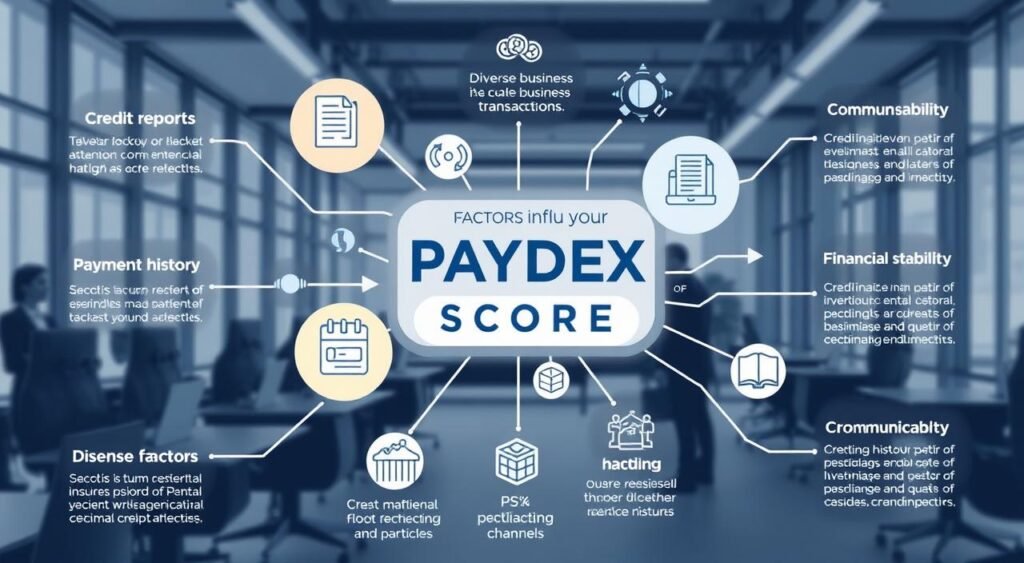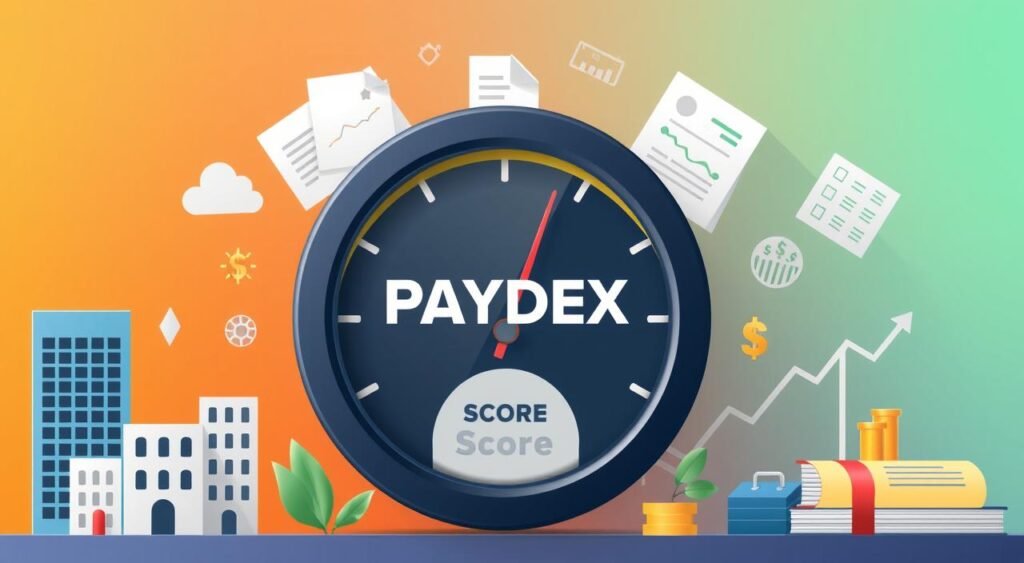Did you know a PAYDEX score of 80 or higher can really help your business? It can make it easier to get good credit terms and find new opportunities. Businesses with high scores get more financing and stronger partnerships because they’re seen as reliable1.
Dun & Bradstreet created this score, which goes from 0 to 100. It shows how good your company is at paying bills on time2. When others look at your business credit report, they check your PAYDEX score. This helps them see if you can handle your finances well2.
Knowing how to keep your PAYDEX score high is key. It helps your business grow, improves your financial health, and builds better relationships with suppliers. It’s not just about keeping a good score. It’s about using it to get ahead in business.
Key Takeaways
- A PAYDEX score ranges from 0 to 100, with scores of 80 or above considered excellent.
- Timely payments and positive payment history are crucial for maintaining a strong PAYDEX score.
- Regularly checking your business credit report for errors can help improve your score.
- Building strong trade relationships with suppliers enhances your PAYDEX score.
- Managing your cash flow effectively is vital for sustaining a high PAYDEX score.
Understanding the PAYDEX Score
The PAYDEX score is key for checking if your business pays bills on time. Dun & Bradstreet (D&B) manages it. It goes from 0 to 100, with higher scores meaning you’re more reliable3. It shows how well your business pays bills and is important for lenders and vendors4.
What is a PAYDEX Score?
The PAYDEX score shows your business’s financial health. A score of 80 or more means you pay bills on time or early, showing you’re creditworthy5. D&B needs at least three payment experiences from two tradelines for a score5. Big payments early on help improve your score, leading to better credit terms5.
The PAYDEX score is more than just a number. It helps landlords decide if they should lease to you, lenders to approve loans, and suppliers to set payment terms5. So, a good PAYDEX score can lead to more business opportunities and better financial deals3.
Why a Strong PAYDEX Score Matters
A high PAYDEX score boosts your business’s reputation and opens new doors. A score above 80 shows you pay bills on time, making you less risky for lenders and suppliers6. This is key in the competitive world of business credit, helping you get funding.
A low PAYDEX score means you might miss payments, scaring off partners and lenders7. So, aiming for 80 to 100 is crucial. It shows you’re financially reliable6. Lenders and partners often check this score to decide if they want to work with you.
Also, paying vendors on time is important for your business’s credit6. Being financially responsible helps build a strong PAYDEX score. This score is vital for getting business funding, as it shows you’re reliable.
How the PAYDEX Score is Calculated
The PAYDEX score is based on your business’s payment history with vendors and suppliers over the last year. Dun & Bradstreet collects data on how quickly you pay your bills. You need at least two suppliers to report three payments to get a score8. Scores range from 1 to 100, with 80 or higher showing you pay on time8.
Timely payments are key. Paying big bills early can really boost your score. Trade references also matter a lot. More references mean a better score. In the US, the number of businesses with three or more references grew from 7 million to 11 million, a 57% jump9.
Your payment history affects your score. Too many negative reports can lower your score to 1, showing a high risk of late payment8. Keeping a good payment history and more trade references is crucial. It improves your financial standing and opens up more business opportunities.
Key Factors Impacting Your PAYDEX Score
Your PAYDEX score is key for getting good business credit. Several factors play a big role in this score. Your payment history is a major one. Paying bills on time can really boost your score.
A PAYDEX score of 75 or higher means you’re seen as low-risk. This is good for getting loans. But, a lower score can make lenders think twice about lending to you1011.
How many trade experiences you have also matters. Having many vendors and suppliers makes your credit profile stronger. This can help you get loans and financing more easily10.
Keeping your outstanding balances low and using credit wisely is also important. A score of 100 shows you always pay early. This shows you’re responsible1011.

In short, timely payments, diverse trade experiences, and good debt management make a strong PAYDEX score. Working on these areas is crucial. It helps keep your business attractive to creditors and opens up financial opportunities.
| PAYDEX Score Range | Risk Level | Implications |
|---|---|---|
| 80-100 | Good to Very Good | Low risk for creditors, favorable loan terms |
| 75-79 | Medium | Potentially negotiable credit terms |
| 1-49 | Low | Questionable repayment history |
Having a high PAYDEX score is key to improving it. It also boosts your business’s credibility in the market.
Building a Solid PAYDEX Score
Getting a good PAYDEX score is key for a strong business credit profile. First, you need a D-U-N-S number to start. This score goes from 0 to 100, with 80 or higher being good. Your score depends a lot on vendors who report your payments to Dun & Bradstreet.
On-time payments are very important for a high PAYDEX score. A high score means you pay bills quickly, which can lead to better credit terms. It also shows you’re reliable to suppliers and lenders.
Having tradelines with several suppliers can help your credit. You should have at least two accounts with vendors who report to credit bureaus. Building strong relationships with these vendors helps your PAYDEX score.
| PAYDEX Score Range | Risk Level | Payment Behavior |
|---|---|---|
| 80 – 100 | Low Risk | On-time or early payments |
| 50 – 79 | Medium Risk | Payments made late, but within terms |
| 0 – 49 | High Risk | Consistent late payments, beyond terms |
By working on building your PAYDEX score and choosing reliable vendors, you can help your business grow121314.
Ways to Improve Your PAYDEX Score
Boosting your PAYDEX score is key for your business’s financial health. It’s all about managing your credit well. Making on-time payments is crucial. A score of 80 or higher means you pay bills on time or even early15.
To get a PAYDEX score, you need at least two tradelines with three credit experiences15. Working with vendors like Office Depot can help your score16. Using automated payments is a smart move to avoid late fees and pay on time.
It’s also important to check your business credit report for errors. Fixing mistakes can protect your score15. Keeping your credit utilization low is also key; high ratios can signal financial trouble15.
Using D&B’s CreditBuilder service for $149 a month can boost your report16. By following these tips, you can not only raise your PAYDEX score but also improve your business’s creditworthiness.
| PAYDEX Score | Payment Timeliness |
|---|---|
| 100 | 30 days early |
| 90 | 20 days early |
| 80 | On the due date |
| 70 | 15 days late |
| 60 | 22 days late |
| 50 | 30 days late |
| 40 | 60 days late |
| 30 | 90 days late |
| 20 | 120 days late |
| 1-19 | More than 120 days late |
Understanding PAYDEX Score Ranges
The PAYDEX score ranges from 0 to 100. It shows how well your business handles its finances. A score of 80 or higher means you pay bills on time, on average5. Businesses aim for at least a score of 75 to get loans and good credit terms10.
Your PAYDEX score interpretation tells a lot about your payment habits. A score below 40 means you often pay late. This can hurt your chances of getting loans or making deals10. A high score means you pay early, while a low score means you pay late5.
To get a PAYDEX score, your business needs at least three payment experiences from two tradelines5. Keeping your score above 80 is crucial. Vendors and suppliers use these scores to decide on financing and payment terms10.
How a Good PAYDEX Score Enhances Business Relationships
A good PAYDEX score is key for strong supplier relationships and effective business partnerships. Scores range from 0 to 100, showing how well a business pays on time. Scores above 80 are low risk and great for building strong supplier connections17.
Keeping your PAYDEX score above 75 is important. Scores between 80 and 100 are exceptional. This can improve your reputation and get you better terms from vendors18. Suppliers prefer working with businesses that pay on time, as it reduces their risks and can lead to better deals17.
Also, a good PAYDEX score can help you land business partnerships. Businesses with high scores are seen as financially stable. This can lead to better agreements18. Keeping your credit utilization below 30% is also key for a strong PAYDEX score. This shows financial trust and can give you more negotiation power17.

Investing in credit monitoring and showing early payment behavior helps achieve a high PAYDEX score. This builds trust with your suppliers and partners18. It usually takes three to six months after getting a DUNS number for Dun & Bradstreet to give you a PAYDEX score18. Working on your PAYDEX score can lead to better collaborations and lasting professional relationships.
| PAYDEX Score Range | Risk Level | Impact on Supplier Relationships |
|---|---|---|
| 80-100 | Low Risk | Preferred for favorable terms and discounts |
| 50-79 | Medium Risk | Requires demonstration of reliability |
| 1-49 | High Risk | May lead to strained supplier relationships |
PAYDEX Score Business Opportunities
A high PAYDEX score opens up many business opportunities. Companies with a score of 75 or more can get better financing terms. This means they can get credit on more favorable conditions10.
Suppliers might also offer flexible payment plans and discounts. This helps you manage your cash flow better and keeps your business running smoothly18.
Using credit scores can help in negotiating with suppliers. A good PAYDEX score shows you’re reliable and can get you better deals15. It also makes investors and partners more confident in your business.
Using Your PAYDEX Score for Small Business Funding
A high PAYDEX score can open doors for small business funding. This score, from 1 to 100, shows how well you pay bills and if you’re good for loans. A score of 80 or higher means you’re seen as low risk, making it easier to get good financing107.
When you apply for a loan, lenders look at your PAYDEX score. Knowing its value helps you manage your business money better.
To get a PAYDEX score, your business needs at least three open tradelines with different payment experiences10. It’s key to make payments on time to build a strong credit history. Keeping your score above 75 is important for getting lines of credit10. Without a good score, lenders might see your business as too risky.
The way your score is figured puts more value on big payments made quickly10. Knowing how your score is made helps you improve your payment history. This, in turn, makes your business more attractive to lenders.

Monitoring Your Business Credit Report
Keeping an eye on your business credit is key to your financial health. It’s important to check your PAYDEX score often to make sure it’s right. A good PAYDEX score, from 1 to 100, helps lenders trust you. This makes it crucial to keep an eye on it19. Business credit scores range from 0 to 100, unlike personal scores which go from 300 to 85019.
Many business owners, 72%, don’t know their credit scores. This can hurt their financial health19. Knowing how to read your credit report helps you make better financial choices. Also, paying on time and having different types of credit can boost your scores20.
Checking your business credit often can spot errors or fraud early. Business credit identity theft is becoming more common, making it even more important to be careful19. Working with agencies like Dun & Bradstreet, Equifax, or Experian gives you a clear view of your finances.
| Credit Bureau | Business Credit Score Range | Notes |
|---|---|---|
| Dun & Bradstreet | 1 – 100 | Scores of 80 or above indicate a good credit risk20. |
| Equifax | 1 – 100 | Multiple scores; lower scores can sometimes mean stronger payment. |
| Experian | 1 – 100 | Scores of 80-100 are low risk; 50-79 medium risk20. |
Conclusion
Knowing the PAYDEX score importance is key for good financial ties and new business chances. Dun & Bradstreet’s PAYDEX score checks how well you pay bills. It’s vital for getting better loans and lower interest rates21.
Making payments early boosts your score more than just on time payments. This improves your business credit and trust in the market21.
Working on your PAYDEX score helps your business grow. A high score means you’re more likely to get credit and better loan terms21. It also helps manage cash flow and improve supplier relationships21.
In short, focusing on your PAYDEX score and improving business credit opens up many chances. Keep an eye on your payments and credit reports. This keeps your business financially strong and ready for new opportunities2223.
FAQ
What is a PAYDEX score and why is it important?
How can I improve my PAYDEX score?
What factors impact my PAYDEX score?
How does a high PAYDEX score benefit my business?
What do PAYDEX score ranges indicate?
How can a solid PAYDEX score impact my supplier relationships?
Why is monitoring my business credit report important?
What role does a D-U-N-S number play in my PAYDEX score?
Source Links
- PAYDEX Score: The Dun & Bradstreet Business Credit Rating – https://ramp.com/blog/what-is-a-paydex-score
- Understanding the PAYDEX Score: Your Business’s Credit Score 📊🏢 – https://www.linkedin.com/pulse/understanding-paydex-score-your-businesss-credit-paul-a-damiano-l3t4e
- A Guide to Understanding Business Credit Ratings | Nav – https://www.nav.com/blog/the-ultimate-guide-to-finally-understanding-business-credit-ratings-in-2024-3180233/
- Understanding the Three Major Business Credit Bureaus – https://www.score.org/resource/article/understanding-three-major-business-credit-bureaus
- PAYDEX Score: The Only Ultimate Guide You Need To Read – https://www.forbes.com/advisor/credit-score/paydex-score/
- What Is A Paydex Score? | Bankrate – https://www.bankrate.com/credit-cards/business/what-is-paydex-score/
- Understanding the Paydex Score – https://www.businessinsider.com/personal-finance/credit-score/what-is-paydex-score
- D&B PAYDEX Score FAQ – Business Credit Score Guide – https://northshoreadvisory.com/business-credit/business-credit-scores/dnb-paydex-score-faqs/
- The PAYDEX score is calculated by the Trade algorithm which examines individual experiences, classifies them into various classes, weights them according to the dollar amounts for each category and then multiplies by the individual index weight to comput – https://docs.dnb.com/static/doc-uploads/supplier/en-US/support/FAQs.pdf
- PAYDEX Score: The Dun & Bradstreet Business Credit Rating – https://www.nav.com/business-credit-scores/dun-bradstreet-paydex/
- PAYDEX® Business Credit Score Guide – Huddle Business Capital – https://huddlebc.com/blog/paydex-score-guide
- How to Get a PAYDEX Score of 80: The Essential Guide – https://www.unitedcapitalsource.com/blog/paydex-score-80/
- Paydex Scores: Your Key to Small Business Financial Success. – https://www.paycron.com/blog/unlocking-financial-success-a-comprehensive-guide-to-paydex-scores-for-small-businesses
- 6 Ways to Build Business Credit | American Express – https://www.americanexpress.com/en-us/business/resources/grow-business/ways-to-build-business-credit/
- How to Get an 80 PAYDEX Score | eCredable – https://business.ecredable.com/resources/blog/how-to-get-80-paydex-score
- How to Build a Good Paydex Score – https://smallbusiness.chron.com/build-good-paydex-score-10156.html
- PAYDEX Score: The Only Ultimate Guide You Need To Read – https://www.linkedin.com/pulse/paydex-score-only-ultimate-guide-you-need-read-echeckplan-6qgze
- Paydex Score: Everything You Need to Know – https://paymentcloudinc.com/blog/paydex-score/
- Business Credit Scores and Reports | Nav – https://www.nav.com/business-credit-scores/
- How to check your business credit – https://www.creditkarma.com/advice/i/how-to-check-business-credit
- The Essential Guide to Understanding What is a Paydex Score and Net 30 Vendors – https://theceocreative.com/the-essential-guide-to-paydex-scores-and-net-30-vendors/
- Business Credit Score: Unlock New Growth Opportunities – https://loanbud.com/business-credit-score-unlock-new-growth-opportunities/
- 11 Things You Should Know About Your Business Credit Score – https://www.score.org/resource/article/11-things-you-should-know-about-your-business-credit-score

